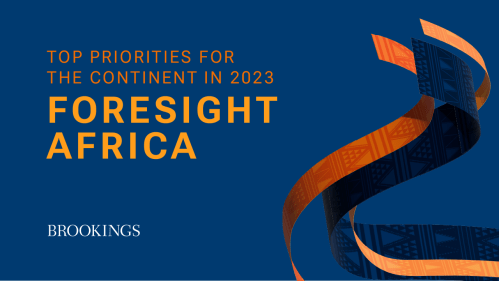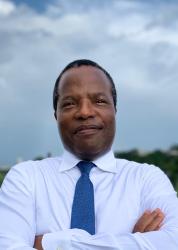On Monday, January 30, the Brookings Africa Growth Initiative (AGI) will launch its annual flagship report, Foresight Africa.
Since we launched the previous edition of Foresight Africa in January 2022, our world has changed remarkably. Russia invaded Ukraine—an unanticipated event that roiled the global economy and sent food, fuel, and fertilizer prices sky high. Sanctions on Russia resulted in trade and logistical bottlenecks, which added more pressure on already strained supply chains. The U.S. Federal Reserve and other major central banks’ unrelenting efforts to tame inflation ushered in a new era of high interest rates and aggravated several countries’ ability to settle their international financial obligations. Meanwhile, the uneven recovery from the COVID-19 pandemic continued to feature in headlines across Africa and elsewhere. The combination of fragility in parts of the African continent and adverse weather conditions dampened economic growth in the region in 2022.
With these external and internal headwinds, it is easy to be pessimistic about Africa’s prospects. Yet, time and time again—as we have seen in the case of the Ebola crisis, HIV/AIDS crisis, and now the COVID-19 pandemic—Africa has proved resilient. We must be conscious of the danger of a single story—especially as many African countries will continue to fare well, despite the odds. Indeed, even though the region is unlikely to be fully out of the woods in 2023, the Economist Intelligence Unit forecasts overall growth of 3.2 percent. Medium-sized economies, such as Senegal, Côte d’Ivoire, the Democratic Republic of Congo, and Kenya, will drive much of this growth—with predicted growth rates of 5 to 7 percent in the year ahead. On the other hand, the region’s economic powerhouses (South Africa, Nigeria, and Egypt) are expected to record slower growth.
Despite these obstacles, I open this year’s edition on an optimistic note, bearing in mind Africa’s resilience and demonstrated capacity to weather severe headwinds. This optimism is buoyed by several factors: an enhanced collaboration that culminated in operationalization of the African Continental Free Trade Area (AfCFTA); the coming together of African institutions (the African Union, Africa CDC, United Nations Economic Commission for Africa, African Export-Import Bank, and others) to secure funding for vaccines; and the region’s rapid adoption of technological innovations to address practical problems—as evidenced by the innovative digital services that boomed during the pandemic.
Being cognizant that there have been few moments in history where the world has experienced such a multitude of successive shocks, going into 2023, we see renewed solidarity and collaboration emerging across Africa to address the confluence of crises. I and the Africa Growth Initiative team are therefore excited to feature Africa’s newfound solidarity on this year’s cover. This is visually represented by ribbons flowing together and moving in the same direction, underpinned by a common purpose. The vibrant colors and ethnic texture in the ribbons embody the continent’s diversity, dynamism, and action toward a future together for the greater good of all Africans. Moreover, in sharp contrast to previous editions, this year’s report includes brand new themes based on feedback from policymakers on education and skills and cities and urban development. We are also proud that women account for a significant proportion of our contributors—and as we did last year, we have dedicated a full chapter to gender, specifically the gender dimensions of Africa’s economic recovery, and what strategies policymakers should be attuned to in order to close the gender gap.
As with every iteration of Foresight Africa, we aim to capture the top priorities for the region in the year ahead, offering recommendations for supporting Africa at a time of heightened global turbulence. We hope that Foresight Africa 2023 will promote dialogue on the key issues influencing development policy and practice in Africa throughout this year. Such ideas will ultimately provide sound strategies for expanding the benefits of economic growth to all Africans in the years ahead.
We will continue to incorporate the feedback we receive from our readers and lead the debate on Africa’s priorities through high-level convenings, impactful research, actionable policy briefs, and timely commentaries.
You can use #ForesightAfrica to follow the debate on Twitter or send your thoughts to @BrookingsGlobal to be part of the conversation.
Finally, we hope that you will join us for our launch event on Monday, January 30.





Commentary
What should be the top priority for Africa in 2023?
January 27, 2023